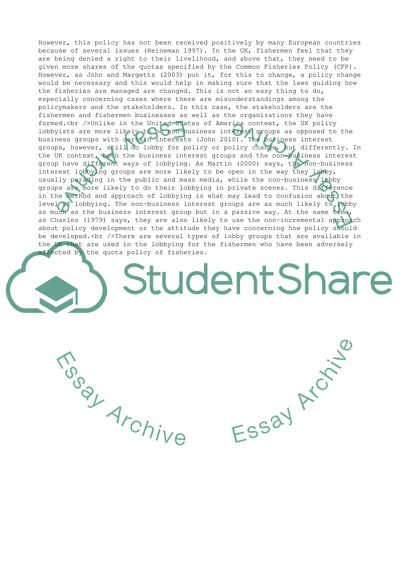Cite this document
(Lobby Groups Lobbying the EU on Behalf of British Fishermen Case Study Example | Topics and Well Written Essays - 2500 words, n.d.)
Lobby Groups Lobbying the EU on Behalf of British Fishermen Case Study Example | Topics and Well Written Essays - 2500 words. https://studentshare.org/business/1836835-define-the-types-of-actors-involved-in-lobbying-the-eu-on-behalf-of-british-fishermen-present-a-theoretically-based-empirically-supported-lobbying-strategy-for-1-of-these-actors-lobbying-for-an-increase-of-british-fishing-quota-of15over-next-5years
Lobby Groups Lobbying the EU on Behalf of British Fishermen Case Study Example | Topics and Well Written Essays - 2500 words. https://studentshare.org/business/1836835-define-the-types-of-actors-involved-in-lobbying-the-eu-on-behalf-of-british-fishermen-present-a-theoretically-based-empirically-supported-lobbying-strategy-for-1-of-these-actors-lobbying-for-an-increase-of-british-fishing-quota-of15over-next-5years
(Lobby Groups Lobbying the EU on Behalf of British Fishermen Case Study Example | Topics and Well Written Essays - 2500 Words)
Lobby Groups Lobbying the EU on Behalf of British Fishermen Case Study Example | Topics and Well Written Essays - 2500 Words. https://studentshare.org/business/1836835-define-the-types-of-actors-involved-in-lobbying-the-eu-on-behalf-of-british-fishermen-present-a-theoretically-based-empirically-supported-lobbying-strategy-for-1-of-these-actors-lobbying-for-an-increase-of-british-fishing-quota-of15over-next-5years.
Lobby Groups Lobbying the EU on Behalf of British Fishermen Case Study Example | Topics and Well Written Essays - 2500 Words. https://studentshare.org/business/1836835-define-the-types-of-actors-involved-in-lobbying-the-eu-on-behalf-of-british-fishermen-present-a-theoretically-based-empirically-supported-lobbying-strategy-for-1-of-these-actors-lobbying-for-an-increase-of-british-fishing-quota-of15over-next-5years.
“Lobby Groups Lobbying the EU on Behalf of British Fishermen Case Study Example | Topics and Well Written Essays - 2500 Words”. https://studentshare.org/business/1836835-define-the-types-of-actors-involved-in-lobbying-the-eu-on-behalf-of-british-fishermen-present-a-theoretically-based-empirically-supported-lobbying-strategy-for-1-of-these-actors-lobbying-for-an-increase-of-british-fishing-quota-of15over-next-5years.


